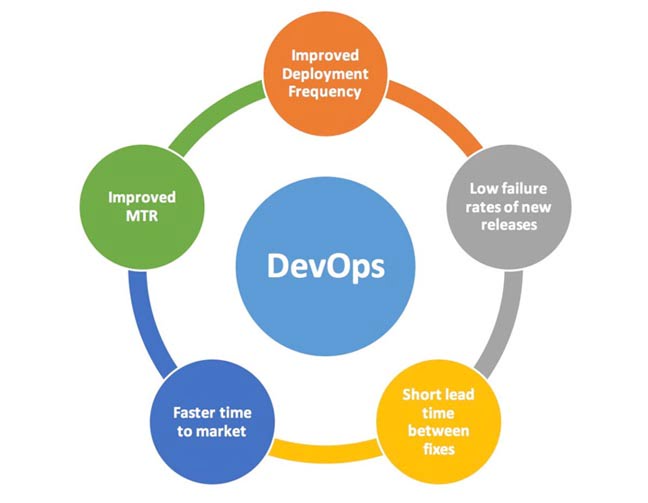Are you a programmer looking to move your career to a DevOps model?
Are you an Ops person who would like to explore all what is DevOps about?
Or are you neither of both, but spent time working with technology and now looking for a career change in the field of Information Technology and have no idea from you should start?
If so, this article is for you.
Here we are going to discuss how you should start DevOps training in Bangalore, to become a successful DevOps engineer.
For years, software teams have been working single-handled. And the most important thing we have noticed that the coding speed of programmers has never been the main issue. The biggest disruption has always been with coming up with code through various acceptances, testing, and integration. As a result, organizations have been releasing products with enormous feature updates in a certain period say that monthly or yearly. That was a normal thing until DevOps came into existence.
With the continuous change in the technologies, the DevOps approach has been the necessity for fast-growing organizations. They use the DevOps approach to release software features and fasten bug fixing. Startups use these techniques to enter in the market quicker and be competitive. So, DevOps is both business development as well as a software development strategy.
Let’s discuss how to learn DevOps in the right way, but first, you need to understand what the DevOps is all about.
What is DevOps?
DevOps is a software engineering culture. The main goal of the DevOps approach is to unify software development and operations.As maintained by the DevOps culture, a single group of engineers takes end to end responsibility of the application development from the initial development phase to the testing, and monitoring, etc.
DevOps approach uses many tools. The infrastructure and the model in which you want to develop applications are the factors selecting DevOps tools.
How to learn DevOps in the right way?
Today, most of the developers understand the business value of DevOps and have moved forwards to implement it. The DesOps approach is easy to define and understand, but equally difficult to implement. Below are the few steps you should follow while learning DevOps from the best software training institute in Bangalore.
1. Understand the collaboration, tools, and strategies for the development, QA, and operations
DevOps is not just about theoretical knowledge; it is more about practical and hands-on knowledge. It comes with a set of common tools and strategies and lets them cooperate over development, testing, deployment, and monitoring activities. So, you should understand the strategies that include:
• DevOps processes
• Communications planning
• Development, integration, and testing tools
• Continuous deployment tools
• Operations tools
Before you go for DevOps training, you must understand these things. Having detailed knowledge is not essential but at least a little bit of idea about these things will help. Not only understanding these tools is enough, but it is also more about where and how you can use development, testing, and deployment technologies. As a DevOps developer, you must be able to send changed software to operations without human beings involved in the way of the processes.
2. Search for the best resources to learn DevOps
Learning DevOps is not an easy task. So, if you think that you may learn it by yourself, possibly you are wrong. Ultimately you will require the guidance of DevOps professionals and trainers if you want to learn it correctly. So, as a learner, firstly you need to search for the best resources which provide the best DevOps training in Bangaloreandenroll yourself for a training course that covers all the aspects of DevOps engineering.
Having someone to ask your query will be added on in your learning process.
here are man books, online courses available to learn DevOps, but tool based DevOps certification will be a great help to students. Classroom training is the best way to have a strong foundation on DevOps concepts, but choosing the right software training institute in Bangalore is still a challenge.
3. Start with culture shift and merge forces
Many of the IT cultures are still following the conventional software development practices, where they used to have isolated development and operational teams. Learn about basic DevOps culture things such as programming language, Linux fundamentals, scripting languages, DevOps tools like Git, Jenkins, Nagios, Splunk, and many more. Apart from these, the learner must know of cloud service platforms like Google Cloud, Microsoft Azure, AWS (Amazon Web Services) and concepts like Infrastructure as a code.
As in the traditional application development process, each time was working separately and hadits processes without consideration of others. So, learn how to merge forces from various processes and synchronize them to work them correctly.
4. Automate processes
The main purpose of the DevOps approach is to automate the release and deployment process. The errors should be fixed at the time of writing code only. The team works in a synchronized manner. The key value of DevOps is the automation of software deployment and release. This involves the usage of specific tools to build the environment. The DevOps developer must be proficient in using these tools.
So, when you are learning DevOps programming, at the same time, try to use DevOps tools to automate deployment and release processes.
5. Constant Improvement
Once the thing comes into the practice, you will gradually learn more. Many new things will be there on the way when you start practicing. Sometimes, you may find changes too hassle full and feel like giving up finding an easier path. But don’t give up on something. There is another solution to every problem.
However, those, who wish to cross the boundaries and learn new tools, technologies, and processes, will find new systems and transformation daily and become more efficient. Giving more time and efforts to focus on better DevOps solutions will provide you extraordinary results in the journey to become a successful DevOps professional.






